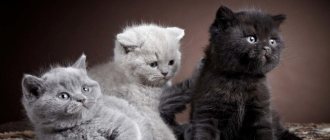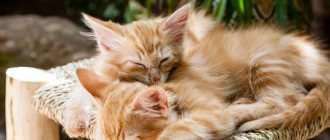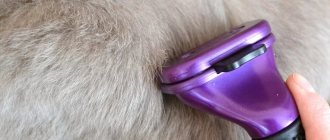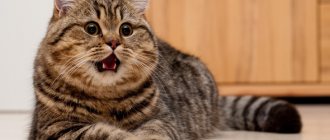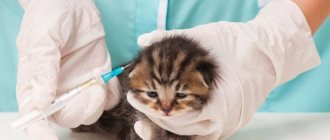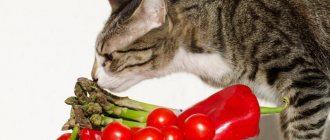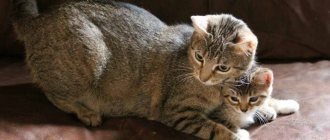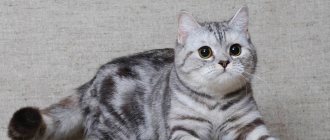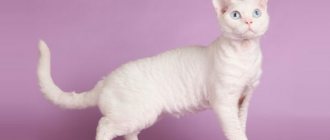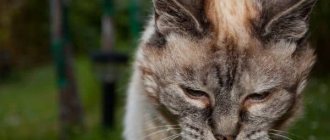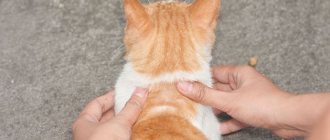In order for a new family member to fully develop and grow up absolutely healthy, it is necessary to develop the correct diet from the first days of the animal’s stay in the house. You will learn in our article what to feed a British kitten and what foods are best excluded from the menu of your four-legged friend. Take this issue seriously and responsibly, because healthy eating is the key to a long and happy life for your new furry friend!
A kitten of the British breed is an amazing animal with a beautiful face and funny manners! You won’t be bored with this pet; they are active and playful, but quite demanding in care.
You can find out the difference between a Briton and a Scot here
Feeding a British baby at 1 month
Any living creature needs breast milk after birth, and the British baby is no exception. In the first month of life, a cat should be under the reliable care of its mother cat. Her milk contains all the components necessary for growth and development.
During this period, it is important to provide the cat with proper nutrition so that the remaining milk can receive all the necessary substances, thanks to which the kitten will develop a strong immune system.
If the nurse has some health problems, or for some reason the kitten cannot be under the care of the parent, the owners of a furry pet should develop a healthy diet for the newborn. So, what to feed a British kitten in the first month of life:
- In pet stores you need to purchase special milk for newborn kittens. This product contains a correctly selected composition of components, close to breast milk.
- Gradually, mashed egg whites and liquid semolina porridge cooked in skim milk can be added to the diet. Portions should be minimal. The number of feedings per day is 3-4 times. These foods are also included in the diet of breastfed kittens.
Nutrition rules: basic recommendations
Cats are primarily carnivorous animals.
They require consumption of meat and fish. But not all meat and fish are created equal for Brits. For example, you should avoid pork altogether. Poultry, rabbit, and beef will be beneficial. In order for the animal to receive only useful substances and microelements, the diet must include grains and vegetables.
Healthy cereals include boiled buckwheat, oatmeal and barley. Oatmeal can be steamed with boiling water or milk, but given to the animal only slightly warm.
The diet of a British cat should include the following vegetables: cucumbers, zucchini, carrots, beets, cabbage. Vegetables should be purchased in season so that they contain a minimum amount of nitrates. Root vegetables can be given raw, stewed, or made into broth.
To strengthen the immune system and maintain healthy microflora in the body of a British cat, you need to include low-fat fermented milk products in the diet, for example, kefir and fermented baked milk. Bran, which contains beneficial vitamin B, can be added to such products.
Before feeding your British cat, you need to remember a few important rules:
- Food should be without salt and without sugar.
- The meat should be lean; it is better to exclude pork from the diet.
- Meat and vegetables can be raw or boiled.
- You should not give your cat fried food.
- Food should be at room temperature or slightly warm.
- There must be clean drinking water in the bowl.
Natural food
Natural food is the key to your pet’s health and well-being.
Unfortunately, not all owners of British cats can afford such food. The process of preparing dishes from the correct menu takes a long time. If you have free time, you can provide natural food to your pet. For the menu, you can use dishes from meat, fish, cereals, vegetables and dairy products.
Many veterinarians often argue about the dangers and benefits of raw and boiled meat. After cooking, not many useful substances remain in the meat, but the causative agents of various diseases are killed.
If you want to feed your Briton raw meat or fish, then you need to heat treat the products:
- meat or fish must first be frozen in the freezer;
- After freezing, the food must be doused with boiling water.
Using such processing, you will preserve the beneficial properties of the products and make them safe for consumption.
When it comes to fish, it is better to choose low-fat varieties of sea or ocean fish. It could be pollock, hake, limonella, navaga. River fish is prohibited! The fish is boiled and all the bones are removed. In natural nutrition you need to adhere to some important rules:
- products must be fresh;
- sugar, salt and other spices are prohibited;
- All sweets and flour products are prohibited;
- Alcohol, coffee and tea are prohibited;
- nuts, potatoes and tomatoes are prohibited;
- Butter is prohibited.
Prepared food: dry and wet food
Not every owner of a British cat can afford to feed their pet natural food. This process takes a lot of time. The modern pet food market is simply overflowing with various offers. What to feed a British kitten? How to choose the right food?
Manufacturers of modern food for British cats place all the necessary information on the packaging. All you need to know is the cat's age and body weight. The rest is a matter of taste. There is no need to buy a large pack at once. Take the smallest package, let your pet try it, and see how much he liked this food.
If you feed your British dog dry food, be sure to check the presence of drinking water in the bowl. It is advisable to choose a glass or enamel bowl; the water needs to be filtered; it is not necessary to boil.
Feed should be given in portions. The daily dose should be divided into 4 doses. Pour one part into a bowl at equal intervals.
If the kitten has not eaten all the food, then you need to throw out the remaining food and add a new portion. Remember that food should always be fresh.
Many kittens do not really like dry food, but prefer wet food. This food is usually sold in small packages that are intended for 1-2 meals.
To ensure that the animal’s bowl is always clean, it must be washed periodically and treated with a potassium permanganate solution once a day. The bowl should be thoroughly washed of food, placed in a slightly pink solution of potassium permanganate for a few minutes, then rinsed with clean running water. After the bowl is dry, you can pour fresh food into it.
Feeding a British baby at 2 months
The first month of the furry baby's life has passed. His body now requires additional elements. Before feeding a 2-month-old British breed kitten, you need to study the list of acceptable foods necessary for proper growth and development.
Starting from 4-5 weeks of life, solid food can be gradually introduced into the menu. It is better to start with low-fat beef, previously frozen and finely chopped. For one feeding, a serving of 10-15 g is sufficient.
Your baby's diet should also include:
- fresh milk;
- delicious milk porridges cooked with low-fat milk;
- natural soft cheese;
- low-fat cream;
- egg yolk;
- fresh cottage cheese.
You can supplement the menu with pates and canned food purchased from specialized pet stores or veterinary pharmacies. The manufacturer's recommendations regarding age restrictions must be indicated on the packaging.
Experienced breeders do not advise buying cheap products of questionable quality. If you want to pamper your furry baby, buy him a good product from a reliable manufacturer!
Important:
- when introducing new foods into your lop-eared pet’s diet, monitor his body’s reaction;
- do not exceed the permissible limits when feeding the baby, overeating can be fraught with consequences;
- Don’t be lazy to cook separately for a purebred cat; he should not eat food with seasonings, spices and other additives typical of foods consumed by humans.
British kitten: when to vaccinate
Before vaccination, it is necessary to treat the kitten against fleas, and 2-3 days after disinfestation, give an anthelmintic drug. After 10 days, antihelminthic measures are repeated and after another 10 days you can go for an injection.
The first time vaccination is carried out at the age of 10-12 weeks, using a complex drug (Nobivak, Multftel-4, Felovax, etc.), which protects against:
- rhinotracheitis;
- calcevirosis;
- panleukopenia.
After three weeks, revaccination is done. After 14 days, the body will develop immunity and the cat can be released outside and transported around the city. Rabies vaccination is given separately. It is convenient to get a passport; it states the dates of vaccinations and what drug was used.
Be sure to read:
How long do Scottish fold cats live: what influences them, vulnerabilities, how to prolong life
Without such a document, the animal cannot take part in exhibitions, club breedings, travel by train, or cross the border. Vaccinations are done annually. This procedure is necessary for all cats, including those who do not go outside. An infection can be brought into a home by a person on clothes or shoes.
Feeding a British baby at 3 months
The three-month-old British shorthair delights his new family with his first achievements and skills. At this age, kittens already go to the toilet on their own, spend a lot of time in active games and enjoy exploring the world around them.
In order for this process to be as beneficial as possible for the growing body, it is necessary to continue to properly feed British kittens, including all new products in the individual menu.
What to feed British kittens at four months:
- milk;
- egg yolk;
- boiled or raw frozen meat (beef, chicken);
- by-products are added to the diet;
- dairy products;
- canned food for 3 month old kittens;
- boiled sea fish without bones;
- porridge;
- grated vegetables.
The number of feedings per day is 4 times. Portions are moderate. You should not give your kitten several new foods at once. It is necessary to gradually introduce additional ingredients, not forgetting to monitor the baby’s condition.
An approximate list of products to feed a British kitten
- porridge with milk, oatmeal, semolina, sometimes rice
- dry oatmeal, ground in a blender as an additive to minced meat
- low-fat fermented milk products (kefir, fermented baked milk, baby curds, sour cream)
- -1-2 times a week it is recommended to add raw or boiled egg yolk to the kittens’ diet
- raw frozen, or chicken, and turkey (preferably lean breast)
- raw or boiled rabbit meat, beef, cut into thin strips, ground beef, only homemade
- chicken livers, stomachs, hearts, necks, boiled
- boiled doctor's sausage, children's sausages (can sometimes be given as a treat)
- Give seafood carefully; kittens may develop diarrhea.
Starting from 1.5 months, you need to give vitamins for kittens, and in the case of the British, these should be vitamins with a high calcium content; it is better to give preference to natural vitamins from Canina (Canina) and Gimpet.
If you decide to feed British kittens with industrial food, then it should be exclusively premium cat food - Innova, Orijen, Acana. Before making a choice in favor of one food or another, check out the cat food ratings.
Feeding a British baby at 4 months
At the fourth month of life, the fold-eared purebred cat is already a fully formed animal, with beautiful shiny fur and adult behavior. It has already increased significantly in size, its weight exceeds its original parameters by about three times. At this age, you can safely add special dry food for British kittens to your diet. The number of feedings is reduced, and the dosage of portions is increased.
The main menu continues to be dominated by products acceptable for feeding kittens 3 months of age. Approximately 25-30% of the total diet consists of dry food. During this period, the owner needs to decide on the manufacturer of cat food, giving preference to proven brands. You can consult your veterinarian on this issue, not forgetting to take into account personal observations of your furry pet.
High-quality food is sold at a higher price, but this is not a reason to save on the health of your new friend. You should not buy food for your domestic cat in dubious places; it is better to purchase nutritious products from pet stores that are certified for animal products.
Breeders do not recommend purchasing feed in bulk at local markets. The quality of such products is very questionable, which means that feeding these compounds can negatively affect the health of the animal.
Feeding rules depending on the age of the British
Forming the correct diet for a small kitten of the British breed is the task of every owner of such a cat. And of course, on this issue you should immediately consult with the owner of the nursery where the baby was purchased. The question of what to feed a British kitten arises sharply from the first days of the furry baby’s stay in the house. It is good if at the nursery the child has already been accustomed to some specific food. And it’s not a fact that the current owners will have the opportunity to feed him exactly this. And if the baby was taken very young, then you will have to act almost at random, guided only by general nutritional recommendations for age. Therefore, it is always better to find out in advance what to feed a British kitten for a month, two, three, six months and beyond.
1 month
If a very tiny fluffy Briton appears in the house, you need to know how and what to feed a 1-month-old British kitten? A small purr should eat at least 5 times a day. And you need to feed him porridge and liquid pureed chicken soup. Only cooked specifically for him, and not left from the owner’s plate! And food should be at room temperature - in no case from the refrigerator, and not straight from the stove. Gradually and little by little add cereals and vegetables. When owners are interested in what to feed a British kitten at 1 month old, they most often want to know whether he can already be given dry and wet industrial food? Or is it better to stick to a natural diet?
Experts agree that it is better to introduce ready-made food to kittens at a later age.
2 months
Two-month-old British kittens are fed, in principle, the same way as monthly ones. Therefore, the question of what to feed a British kitten at 2 months should not bother owners who have already chosen a diet for their pet. Even the frequency of feedings changes only by 3 months. In the meantime, it should still be 4-5 times a day. In general, what to feed a British kitten at 2 months is a matter of when the animal appears in the house. If he is just 2 months old, then he should be given the same cereals and soups as if the baby was taken into the family when he was one month old.
Six months
Those who have been keeping a small representative of the British breed at home for 6 months now certainly need to know what to feed a British kitten at six months. Moreover, starting from 3 months, quite significant changes occurred in his diet relative to infant nutrition.
At 3 months, the kitten begins to be given scraped, frozen and pre-scalded red meat (beef - 30 grams per day, no less). Plus finely chopped boiled chicken breasts (also about 30 grams). And porridge soups are a must. At the age of three months, you can already introduce your baby to wet industrial food by choosing good canned food from a well-known manufacturer with a special mark “for kittens.” Great options:
- Bozita mini (120-130 rubles per package of 190 grams) is a super-premium class that has a beneficial effect on the quality of “British” wool;
- and Royal Canin Kitten Instinctive (in sauce or jelly, 85 grams - 52-55 rubles per pouch) and Babycat Instinctive mousse (190 grams - approximately 95 rubles per can).
The choice of dry or wet industrial food, when the question is what to feed a British kitten for six months, depends mainly on the financial capabilities of the owner. Veterinarians certainly recommend premium and super-premium food, but this, of course, is expensive. Although treatment in case of problems with digestion, liver or kidneys (due to poor nutrition) can be much more expensive. And breeders of British cats are well aware of the weak points of these animals - namely the liver, kidneys and gastrointestinal tract. So you have to get used to feeding these big plush creatures well from their very childhood.
From one year and older
When a British kitten grows up, the needs of his body change. Next we will talk about what to feed an adult British cat from 1 year old. Everything is simple here:
- Or natural food (especially if he has been on it since the age of a kitten), but then it is always freshly prepared, balanced and with the right amount of vitamins and microelements.
- Or dry food selected according to the pet’s taste and the owner’s means (but always professional, premium class, at a minimum).
- Either dry + wet food. Premium class, one manufacturer, in the proportion 70x30. Preferably after consultation with a veterinarian.
Having decided what to feed a British cat, owners are often interested in the frequency of the animal’s feeding. Breeders are confident that two meals a day are enough for adult Britons.
Feeding a British baby at 6-12 months
In the second half of the first year of life, the British reproductive system matures. This period is somewhat difficult both for the pet itself and for its owner. Some difficulties may arise when raising a British cat, which is already beginning to show its character.
In order for your furry friend to show maximum calm and not upset his owner with hooligan actions, it is necessary to continue proper nutrition, thanks to which the British dog will develop good behavioral manners and obedience.
What can you feed a British cat from 6 months of age:
- dairy products;
- egg yolk;
- boiled meat, frozen;
- boneless fish;
- porridges of different types;
- pieces of fruit and vegetables;
- crackers, rye bread;
- offal;
- ready-made canned food for cats by age;
- dry food is a priority, making up about 50% of the total diet.
From this age, the animal’s body no longer copes well with digesting lactose, so milk and milk cereals are gradually removed from the pet’s diet.
At 6-8 months, the number of feedings per day is 3 times; closer to a year, the number of meals is reduced to two times.
Breed Features
British cats are a breed that developed naturally in nature. It has certain characteristics that have survived to the pets of our day. For example, they do not have hereditary diseases.
When buying British kittens, it is important to know the characteristics of the breed regarding digestion:
- Oral cavity. British people are rarely affected by dental caries, but tartar is a common occurrence. If untimely removal occurs, the gums begin to become inflamed, which leads to tooth loss. In this situation, it is no longer possible to talk about high-quality absorption of food. After changing the milk line, which ends by six months, the owner is advised to carefully monitor the health of the pet’s teeth and gums.
- Tendency to obesity. Feeding the British has a special role, since the breed is prone to weight gain. Exceeding caloric intake by 1% today will lead to a couple of extra pounds in a few days. This will affect not only body parameters, but also health. Obesity leads to liver disease, cardiovascular disease and diabetes.
- Constipation. British cats are prone to intestinal blockages. Normally, bowel movements should occur once a day. If this does not happen, then you should pay attention to the behavior and condition of the pet. If you notice lethargy, lack of appetite, or tension in the abdominal wall, it is recommended to immediately consult a veterinarian.
- Susceptibility to urolithiasis. Because of this factor, the British should not be fed a mixed diet. When feeding natural food, it is recommended to completely avoid ready-made dry kibble, even as a treat.
The peculiarities include some of the character traits of the British, which are reflected in their diet.
For example, they are self-sufficient, independent and arrogant. Therefore, the cat will never beg for food. If she wants to have a snack, she will quietly wait near the bowl.
The naturalness and naturalness of the breed determined the preservation of predatory instincts in modern cats. Therefore, their diet necessarily includes meat, some of which is served raw.
Introducing homemade food into the kitten's diet
Owners of British breed cats independently determine the type of food for their animal. You can give priority to feeding your pet canned food and dry food created specifically for kittens, but in any case, a carnivorous animal by nature needs meat, so this ingredient must be present in the daily diet.
The best type of meat is beef. It should be given raw, after having been frozen in the refrigerator for three days. Before feeding, the product is treated with boiling water, which allows you to destroy dangerous helminths and other harmful microbes.
It is better to feed young British kittens with ground beef prepared independently. You should not add salt and other spices to the finished composition that are unacceptable for feeding purebred cats. You can also give your baby finely ground raw food.
A large, straight-eared pet can independently absorb meat from larger pieces, but to avoid unnecessary problems, experts still recommend pre-cutting the meat to make it easier for the animal to absorb food.
Starting from 2 months of age, a British dog can be given boiled beef liver once a week. About 3-4 times a week, boiled offal of various types is added to the main menu. The serving should not exceed 100 g.
Kittens also need lean fish, preferably of sea origin. It can be served raw. The product is first frozen, doused with boiling water, and cleared of bones and skins. Fish should be given to a Briton no more than 2 times a week.
Once a week, the diet of a furry family member should include boiled chicken eggs, in particular the yolk, previously crushed. This product can be served in combination with canned food or porridge.
As for the porridge:
- up to three months, a small kitten is fed milk porridge, diluted with water, without sugar;
- from 6 months, porridge is cooked exclusively in water, without milk;
- this product is added to the diet 3-4 times a week;
- priority is oatmeal, semolina and rice porridge;
- You can give a ready-made dish in combination with meat ingredients or canned food for kittens.
The diet of a domestic cat should also include boiled vegetables: cauliflower and carrots (good for the eyes). A drop of vegetable oil is added to the crushed product. They can also be mixed with porridge and meat.
3-4 times a week, a British kitten should be given low-fat fermented milk products: kefir, cottage cheese, yoghurts (natural), cream, kefir. Adult cats should have this food no more than 2 times a week. Be sure to keep an eye on the expiration dates of store-bought products. Do not feed your furry pet dairy products that have expired and are of questionable quality, as this can cause serious poisoning and other adverse consequences.
The British diet, based on natural products, is very useful and necessary for healthy growth and proper development. You cannot feed the animal food from your table, only separate food preparation, without salt, spices and other additives! Avoid overeating, as your cat may become fat and develop chronic illnesses.
Proper diet for a British kitten
An optimal diet is important for a growing kitten, as food allows the small body to develop. Before purchasing a pet, you should carefully study the feeding rules.
A small pet requires five to six meals a day. In this case, the daily ration does not exceed 150 g.
The owner should constantly monitor the drinking bowl - it should always be full. Prolonged lack of water leads to dehydration of the body. For kittens, this situation is most critical due to their low body weight and imperfect formation of internal organs and adaptive systems.
If there are signs of hypovitaminosis, you should contact your veterinarian. Your doctor will help you choose the right vitamin complex and other biological supplements.
If an animal has a food allergy, it is recommended to exclude the allergen product from the diet and conduct a veterinary examination.
Dry and wet food for the British
A more simplified method of feeding a British cat is based on ready-made food. This option is great for owners who are unable to regularly prepare healthy food for their pets. The main thing is to choose the right food and calculate the daily intake in accordance with the age of the kitten.
Responsible manufacturers create high-quality products that contain all the vitamin and mineral complexes necessary for the British. The range of such products includes a wide variety of compositions in dry and canned forms. When choosing, be sure to study the manufacturer’s recommendations published on the packaging!
Which food to choose, dry or wet, is up to you! You can combine these two types in an approximate ratio of 50/50, 60/40 or 70/30%. If the British cat is fed exclusively dry food, it is necessary to provide the animal with free access to clean drinking water.
The canned product is placed in a clean bowl in strictly measured quantities for one feeding. It is unacceptable to leave food “for later”; after each feeding, the animal’s bowl is cleared of product residues and thoroughly washed with clean water.
Advice from experienced breeders:
- For favorable growth and development, combine dry food with wet food. It is better to serve canned products for breakfast and dinner, and during the day you can feed your pet with dry food.
- Even if you feed your cat exclusively prepared food, regularly add pieces of fresh meat to the standard diet.
- The best food for a purebred British dog is premium (for example, Whiskas, Hills). Do not buy the budget version of the product, as these formulations do not contain enough necessary elements for proper growth and development. After feeding with cheap food, complications in terms of physical health are often observed. If you consume low-quality products, your kitten may develop urolithiasis and other chronic ailments.
- If you plan to castrate a mature British cat, buy special food with the appropriate label. These products contain a balanced complex of essential microelements, taking into account hormonal changes in the animal’s body. Similar rules are followed for cats that have been sterilized.
Rules for feeding dry granules to 3-month-old kittens
Despite all the benefits of dry industrial food, their presence on the menu as the only and main food product can cause undesirable consequences, especially if you feed your pet with them incorrectly. There are a number of recommendations that must be followed without fail:
- Exact compliance with the daily norm. How much food a kitten needs per day depends on its weight, breed characteristics and the type of product chosen. It is easy to determine the norm - you need to study the information on the packaging. Each manufacturer gives its own daily recommendations, depending on the ingredients in the composition and the concentration of nutrients. Failure to follow recommendations may result in overfeeding and overdose of vitamins.
- The daily amount of feed specified by the manufacturer should be divided into equal parts. The frequency of feeding a kitten at the age of 3 months is up to 5 times. It is not recommended to leave food in the bowl. After feeding, it must be removed so that the kitten begins to develop a feeding routine. Food should also be removed for the reason that at 3 months the kitten still has poor control over its satiety and can eat everything that is left for it.
- Compliance with drinking regime. Dry food contains a minimal amount of moisture. If the kitten's diet consists exclusively of industrial food, you need to teach the baby to drink enough water.
To give or not to give “adult” food.
The difference lies in the amount of vitamins and the balance of nutrients. In “adult” food, the concentration will be much higher, and the kitten, in addition to indigestion, may experience hypervitaminosis.
Other differences between food for kittens and the “adult” product:
- An adult cat is no longer growing, so it does not need as many “energy” components; accordingly, the fat and protein content in the food is less. An actively growing kitten needs more protein. If the pet does not receive it in sufficient quantities, this will affect its overall well-being and development.
- Granule size. Food for adult cats is available in the form of large granules. A small kitten whose teeth have not yet strengthened is simply not capable of chewing such large pieces. Swallowing the pellets whole, kittens often choke on them. Kitten products are typically made in small kibble sizes designed for the delicate teeth of small animals.
You should choose dry food for your kitten only according to the age indicated on the package.
Prohibited Products
British cats should not be fed the following foods:
- fatty meat;
- bones;
- river fish;
- fatty fermented milk products;
- egg white;
- sausages;
- conservation (for people);
- fried foods;
- spicy and salty foods;
- sweets, chocolate;
- baking, baked goods;
- food from your table.
The right approach to feeding a British breed cat is the key to good health and long life for a furry family member!
British cats: what to feed is strictly prohibited
Studying the described recommendations will not allow you to fully ensure the health of your pet if you do not know about the main prohibitions: what is better not to feed a British cat. These include:
- a ban on feeding Britons river fish containing many small bones;
- the inadmissibility of using industrial food of budget brands (Kiti Ket, Whiskas, etc.), since they are made from second-rate products that are not properly fortified with vitamins and minerals;
- a ban on adding salt, sugar, and spices to British food (sugar can be replaced with honey);
- You cannot feed a purebred cat with potatoes, legumes, or fatty meat. These products are not digested by the animal's stomach and can cause upset. A similar reaction occurs when a British baby is fed milk after 6 months.
- It is strictly forbidden to give four-legged friends sweet, salty, spicy foods, canned food and other food for people.
If you have a British cat, what to feed it correctly will help you find out the recommendations described. Remember, purchasing a British kitten is not only a great joy, but also a huge responsibility, because purebred animals have weak immunity, and therefore require special care and a special diet. Love and care for your animals like little children and they will reciprocate your feelings and become real members of your family!
